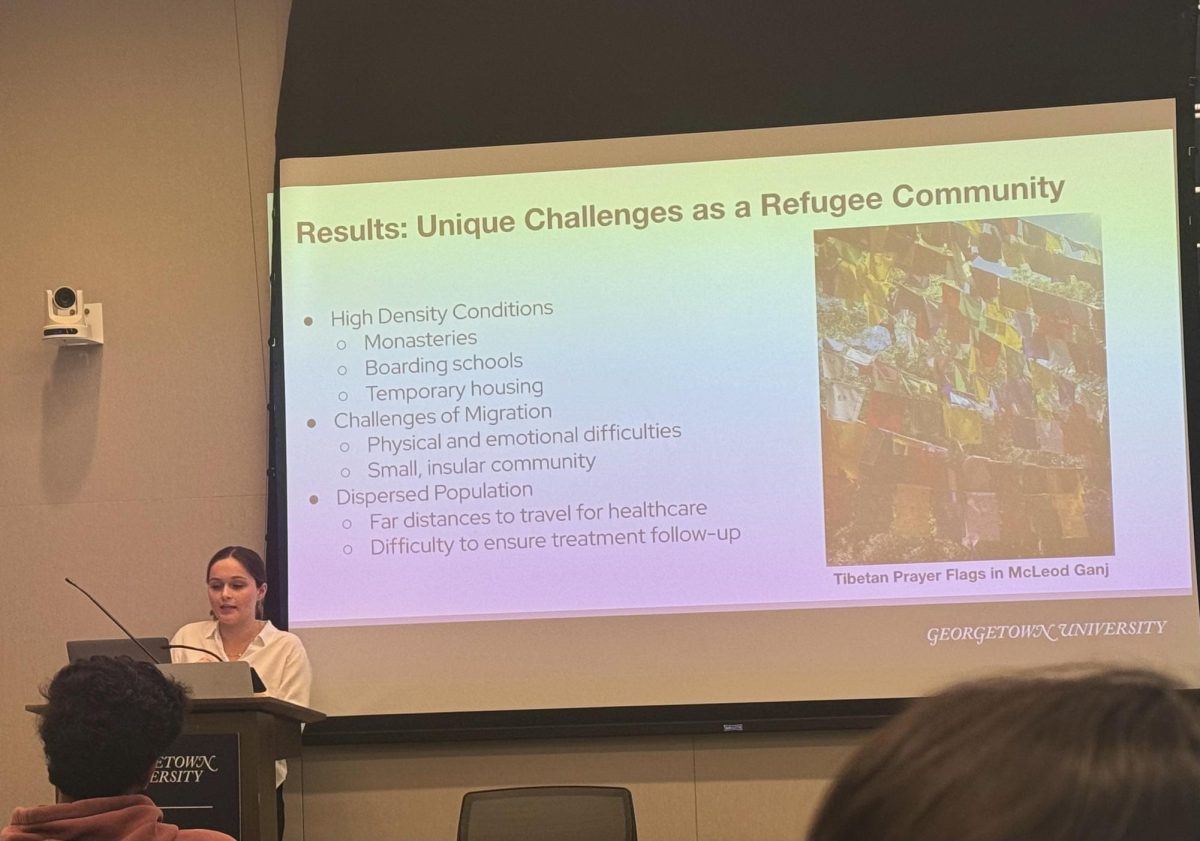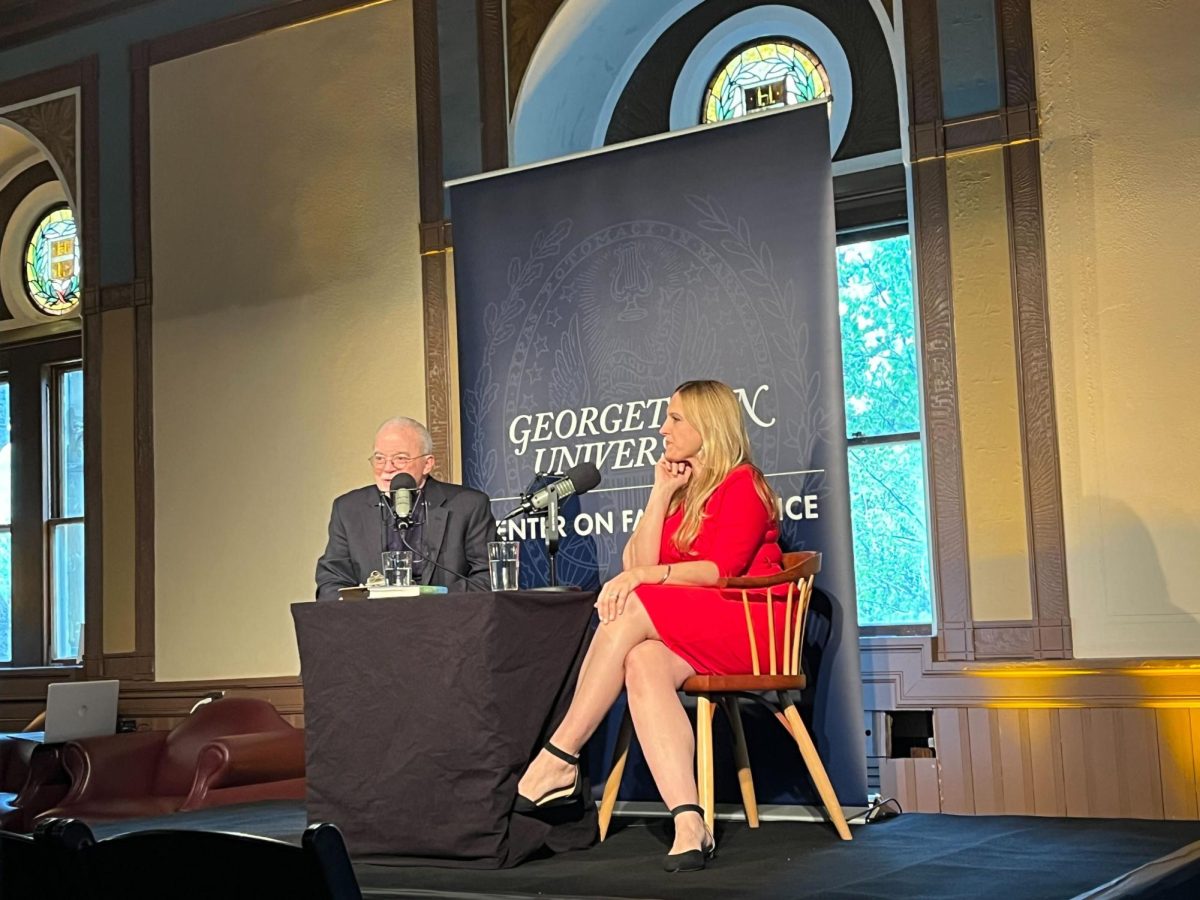The Georgetown University Institute for Women, Peace and Security (GIWPS) launched the first global conflict tracker emphasizing the role of gender March 11.
GIWPS, an organization that researches and promotes the role of women in preventing conflict and building peace, created the Women, Peace and Security (WPS) Conflict Tracker to monitor and evaluate conflicts by centering on women. The tracker, with support from the Carnegie Corporation of New York and the Embassy of Denmark, represents a collection of data from 25 countries at risk of armed conflict, experiencing conflict or in the post-conflict era, including Kosovo, Afghanistan and Colombia.
Jessica Anania, the GIWPS research fellow who led the development of the WPS Conflict Tracker, said that research on peace often excludes women as having a role in peacebuilding.
“Accounting for women in conflict research and analysis is vital; women are leaders in social movements and grassroots organizations, provide frontline humanitarian response, and their inclusion in negotiations is associated with longer lasting peace agreements,” Anania wrote to The Hoya.

Melanne Verveer, executive director of GIWPS and former U.S. ambassador for global women’s issues, said the tracker will contribute research to understanding conflicts through a gender lens.
“We know women are critical to achieving peace,” Verveer said in a press release. “The new WPS Conflict Tracker is a resource for identifying risks and opportunities for protecting women from violence and including women in conflict prevention, resolution and recovery efforts.”
Sami Levick (CAS ’27), who intends to pursue a justice and peace studies major, said the WPS Conflict Tracker will represent how researchers should think about peacebuilding.
“I think that a gender focus is important because women are key pieces of the puzzle when it comes to approaching peace,” Levick wrote to The Hoya. “Women are also a vulnerable population globally, so a tracker that specifically looks at this vulnerable population can give us greater insight as to how different conflicts are impacting a marginalized group, and in turn, can aid us in deciphering the best way to go about conflict resolution.”
The WPS Conflict Tracker advances the goals of United Nations (UN) Security Council Resolution 1325, which instilled the UN’s WPS Agenda by calling for member states to expand the role of women in peacebuilding and create gendered perspectives of conflict.
In particular, the WPS Agenda focuses on four pillars: participation, including women in decision-making; protection, defending women from gender-based violence; prevention, stopping the rise of such violence and relief and recovery, creating a gender lens of recovery measures.
The UN’s studies through the WPS Agenda found that women’s participation in peace agreements increases the likelihood of lasting peace by 20% for two years and 35% for 15 years post-conflict. However, the studies discovered that men primarily enforce decision-making and conflict resolution.
Anania said that the WPS Conflict Tracker differs from other trackers because prior research excluded women, and the tools for monitoring conflict were gender-blind.
“Our new tracker fills this gap by providing current insight into armed conflict through a Women, Peace and Security (WPS) lens and prioritizing women’s experiences and needs,” Anania wrote. “The tracker supports GIWPS’ mission of advancing the WPS agenda in all aspects of conflict, security, and peacebuilding.”
The WPS Conflict Tracker will provide insight into the key risks women may face and the opportunities women can have in peace and security participation. The tracker, which will be updated monthly, also shares a country’s current conflict status and a WPS trajectory for peace, which considers more than 80 data points related to the WPS status.
According to Anania, the tracker will grow to include country-specific pages to provide in-depth, gender-sensitive background and analysis of the conflict and resources with specific policy and advocacy recommendations.
Anania said the WPS tracker serves as an essential resource to researchers and policymakers.
“By providing timely updates and analysis across 25 conflict-affected settings, the WPS Conflict Tracker is a crucial resource for researchers, policymakers, and activists working on conflict and security issues,” Anania wrote. “Insight from the tracker can identify current risks and opportunities for women, reveal research and information gaps, and inform advocacy and policymaking.”
Levick said the tracker will further the need to incorporate a women and gender-based perspective in addressing conflict.
“Many times, women are left out of the conversation, whether it comes to something like conflict tracking or otherwise,” Levick wrote. “Given the rising presence of armed conflict globally, I think that this tracker will help us keep a better eye on how women specifically are being impacted and hopefully lead to effective solutions to help women in need.”








